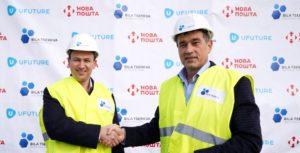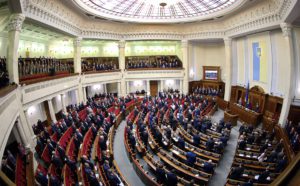
The Bila Tserkva Industrial Park (a project of the UFuture) begins the construction of a new logistic automated depot for courier delivery of goods to the company Nova Poshta in Bila Tserkva. According to the project — the total area of the premises will be more than 3900 square meters, and the cost of the object will exceed $5 million.
“I`m proud that Nova Poshta, known to every Ukrainian, has chosen our Bila Tserkva Industrial Park for scaling. In fact, today industrial parks are not only a profitable location for creating innovative production, but also an investment nanny for a domestic producer and investor. We help with the connection to communications, provide all the necessary infrastructure. I`m sure that the case of this national giant will be the impetus for the further development of the format of industrial parks in Ukraine as a whole,” Vasyl Khmelnytsky, founder of UFuture, said.
The investment project provides for the creation of an innovative terminal, which will include a customer service department, office and social facilities, and attached infrastructure. The two-story building of the logistic depot will have autonomous heating, a centralized ventilation system and air conditioning. Commissioning will take place in autumn 2020.
“We will open branches and an automated logistic depot to ensure fast and high-quality delivery for our customers from Bila Tserkva and another 80 settlements of the region. Depot capacity — 2.8 thousand parcels per hour, up to 50 people will work at the facility,” Volodymyr Popereshnyuk, co-owner of Nova Poshta, said.
The choice in favor of the Industrial Park became possible because of its advantageous location, ready-to-use utilities and turnkey construction in accordance with the international standards of energy efficiency, fire resistance and environmental friendliness. The construction of a new warehouse terminal allows the postal operator to create convenient logistics and quickly deliver goods to Kyiv and the region.
The purpose of the Bila Tserkva Industrial Park is the development of modern industrial production in Ukraine. The park offers industrial land with all engineering infrastructure and ready-made modern production, logistics and storage facilities for rent or purchase. Knowledge and extensive experience in real estate development allow the park team to provide the client with a range of services and services for organizing efficient production.
The total area of the Bila Tserkva Industrial Park is more than 70 hectares. The key difference is in its focus on creating ecosystems and clusters (production, logistics and others). The value of this approach for the client is to establish supply chains, reduce production costs and availability of raw materials. As of the beginning of 2020, six companies are residents of the industrial park. The industrial park belongs to UFuture projects.
UFuture is a holding company of Ukrainian entrepreneur Vasyl Khmelnytsky that integrates his business and impact-investment projects. The company has a diversified portfolio of assets in the fields of real estate, infrastructure, industry, renewable energy, pharmaceuticals, and IT. Currently, UFuture’s assets are estimated at $550 million, and the total capitalization of the businesses it invested in is more than $1 billion.
UFuture’s mission is to secure global connectivity of Ukraine by including the country’s economy and talent into international value chains where the economy and human capital of the state will play an important role.
Nova Poshta Group provides its customers, both business and individuals, with a full range of the logistics and related services. The Group includes Ukrainian and foreign companies, in particular, Nova Poshta, NP Logistic, POST FINANCE and Nova Poshta International.
Nova Poshta is the leader of the logistics market, which provides easy delivery to each client — at the post office, and the address — and allows thousands of entrepreneurs to create and develop a business not only in Ukraine but also abroad. The company’s network has more than 6,000 branches throughout Ukraine, and the number of departures in 2019 alone exceeded 212 million. NP Logistic is a fulfillment service company: storing goods in warehouses, picking and sending orders to the recipient. POST FINANCE is a non-banking financial institution, thanks to which the company’s clients can carry out money transfers and electronic money transactions. Nova Poshta International is developing an international partner network to provide customers with express delivery services in Ukraine and also abroad.
Nova Poshta Group works in compliance with all the norms of Ukrainian legislation. In 2019, the Group transferred more than 4 billion UAH of taxes and fees to the country’s budget. More information about products and services on the website: https://novaposhta.ua/

Ukraine’s Verkhovna Rada has approved at first reading bill No. 2259 on reforming patent legislation. An Interfax-Ukraine correspondent has reported that the corresponding bill was supported by 369 MPs with the required 226 votes. “We already know that during the preparation of bill No. 2259 for second reading, we will hold extensive consultations on amendments to the so-called patent evergreening or secondary patents. We are talking about non-salts, isomers, new therapeutic solutions,” MP Roksolana Pidlasa (the Servant of the People parliamentary faction) said, presenting the document in parliament.
In addition, at an evening session on February 4, the Rada adopted bill No. 2258 on protecting intellectual property rights to trademarks and combating patent trolling with 350 supportive votes.
“Appealing fake patents is long, expensive and difficult, and the responsibility for trolling is almost symbolic. If someone uses your trademark or very similar to it, the copyright holder today has no opportunity of appealing this, except in court. And, unfortunately, such an appeal by the current judicial system is also long, expensive and complicated,” Pidlasa said.
The bill sets the list of grounds for refusal to register a trademark or industrial mark, provides for the opening of a database of applications for trademarks for pre-registration protection.
“Finally, we impose tough sanctions on violators of intellectual property rights, a fine of up to UAH 2 million. Together, these tools make the manipulation with trademarks and industrial designs very difficult, economically disadvantageous and risky,” Pidlasa said.
National bank of ukraine’s official rates as of 05/02/20

Source: National Bank of Ukraine

The export of vegetables, fruits, berries and nuts, fresh, frozen and dried brought Ukraine $339 million in revenue last year, which is 9.4% more than in 2018, and 20.1% more than in 2017. According to a Tuesday report on the website of the Ukrainian Horticultural Association, walnuts, berries and apples were the main product groups providing growth in the export of fruits and vegetables. The growth in revenue from apple exports over two years exceeded 150%, while exports of nuts and frozen berries grew by about 37% in two years.
At the same time, according to the association, the share of these three leading categories of the total export of fruits and vegetables continued to grow and reached 70% in 2019.
“The growth rate of export of fruits and vegetables from Ukraine remains high, but whether the country can keep them in 2020 is a big question, because there have been a number of negative trends, such as a strengthening of the national currency, a shortage of labor for harvesting products, a decrease in raspberry production, decrease in investments in new orchards and berry plants, and other things. At the same time, there is great hope that Ukraine will continue growing for some time thanks to the fruiting of orchards, nuts and berries laid over the past five years,” Economist at the investment department of the Food and Agriculture Organization of the United Nations (FAO) Andriy Yarmak said.
According to the association, Ukraine is not even among the top 50 world leaders in terms of fruit and vegetable exports.
“For example, Lithuania, with a climate not favorable for fruits and vegetables, exports more fruits and vegetables than the entire Ukraine. Poland exports $2.6 billion worth fruits and vegetables – eight times more than Ukraine. Moreover, this includes re-export of Ukrainian berries, and other products of the fruit and vegetable group,” the association said.

Ukraine’s Verkhovna Rada has passed at second reading bill No. 2241 with amendments to the Tax Code on the reduction of the amber production royalty from 25% to 10% from 2022, and by the end of 2020 the interim rate of 5% will be in effect and in 2021 – 8%. An Interfax-Ukraine correspondent reported that 290 MPs voted in favor of the corresponding bill with the required 226 votes.
“The committee at the meeting decided to take into account the proposals submitted by MPs regarding the reduction of the amber production royalty rate to 10% and temporarily set the royalty for the use of mineral resources for the production of amber until December 31, 2020 inclusively in the amount of 5%, until December 31, 2021 inclusive – at 8%. Thus, the 10% rate will be effective from January 1, 2022,” Deputy Head of the parliamentary committee on finance, customs and tax policy Oleksandr Kovalchuk said, presenting the document from the rostrum of the parliament.
An increase in the royalty from 5% to 25% in 2016 led to a decrease in budget revenues under this item, he said.
“Therefore, the proposed approach has a stimulating character for the legalization of amber production,” Kovalchuk said.